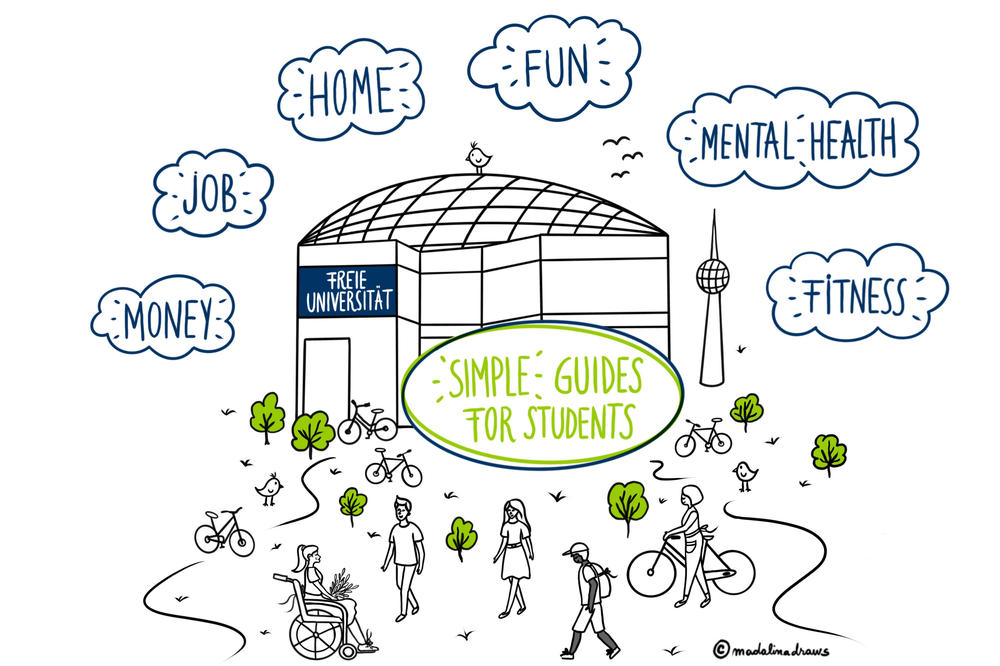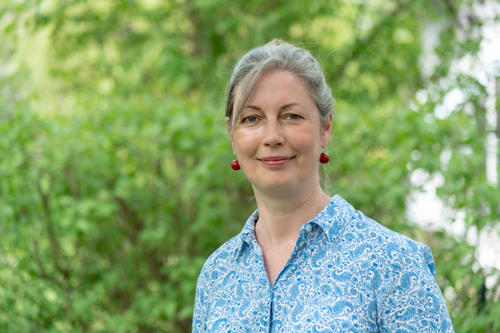Unlocking the Potential of Diversity
An interview with psychologist Luiza Olos from Freie Universität Berlin about the Student Diversity project
May 12, 2021
Breaking down barriers, easing the way: Everyone comes to the university from different backgrounds, and the Student Diversity project offers support.
Image Credit: Madalina Tantarean
First-year students with different life and educational backgrounds often feel they face a seemingly insurmountable mountain of tasks, says Luiza Olos, who holds a doctorate in psychology and is head of the Student Diversity project at Freie Universität Berlin’s Center for Academic Advising and Psychological Counseling. In this interview, she explains how the project, which is funded by the Berlin Quality and Innovation Offensive, aims to help students find their way at the university and how we can break down barriers for students from different backgrounds.
Ms. Olos, what is the Student Diversity project about?
Let’s start with an image: Someone who wants to learn how to climb is standing alone in front of the climbing wall. Looking up, they have this feeling that they are very small and maybe not up to the task. It’s hard to imagine making it to the top.
Studying presents a similar challenge for some students. First-year students and students in general often feel isolated and even paralyzed in everyday university life. The Student Diversity project’s goal is to support them on their educational journey so that studying and student life become easier.
Dr. Luiza Olos from the Academic Advising Center at Freie Universität Berlin.
Image Credit: Bernd Wannenmacher
What might make university life particularly difficult for certain students?
Regardless of gender, age, or where a student comes from, there are institutional hurdles and language barriers that can pose significant challenges. “First generation students,” meaning people who are the first in their family to attend university, might experience this. Or students from families that immigrated to Germany, refugees, students with children, or students with physical disabilities.
Each of these groups presumably faces different challenges when they come to the university?
Exactly. In our project, we focused on breaking down language barriers. International students, for example, are looking for easy-to-understand information in German or English. First generation students often feel intimidated by the technical language used in academic discourse. Deaf students, on the other hand, need explanatory videos with subtitles.
What measures have you developed as part of the project?
The project measures are based on the excellent work of the project’s founder, Sarah Hostmann, who now runs the Welcome office hours for refugees, and on our work together with Tra My Nguyen and other colleagues.
We have created easy-to-understand and clear information on studying, online in the form of wikis and explanatory videos, and in print as flyers and infographics. For prospective students and first-year students, the Online Study Start Assistant (OSA) and the University Studies websites are particularly important sources of information. We constantly check these pages for usability so that we can regularly update and expand the offerings. In addition, we take care of the translation of important pages about studying in English and the subtitling of info videos.
The “Studying 101 – A simple Guide for Students” wiki contains tips on scholarly work and successful time management. Students can also find tips on dealing with stress, exam anxiety and writer’s block. We are currently expanding the wiki to include topics related to studying, such as health, job and apartment hunting, and finances.
What individual support services are available?
We offer interdisciplinary workshops, in person and online. Currently, there is a mixed-media course on “Diversity Resources.” There, students with international curricula vitae or multicultural connections can address questions of identity: What does it mean for them to live in Germany? What is the added value of being at home in several cultures? Often, the participants discover strengths or abilities about themselves that they were not even aware of at the beginning.
Students who started studying at Freie Universität in the 2020/2021 winter semester may never have seen the university from the inside due to the pandemic. Students from higher semesters also report that they miss being present in everyday university life. Does the Student Diversity project also offer strategies for coping with the current situation?
The U.S. author Barbara Sher has said, “Isolation is a dream killer!” What she means by this is that we need to network with other people in order to develop our potential.
To counter the loneliness that many students feel during the pandemic, we have developed some in-person offerings. In compliance with hygiene regulations, we hold outdoor events. Here, students can exchange ideas and encourage each other.
In addition, we participate in what we call Garden Talks, which are organized by colleagues from the Center for Academic Advising and Psychological Counseling. We would like to get back in touch with students and employees of our university more intensively while observing hygiene measures. We have summarized our experiences with these formats in the “Outdoor Counseling” wiki.
It’s natural to feel overwhelmed – or underwhelmed – and lonely during a pandemic. It can help to remember what challenges you have already overcome in your life. What positive experience of my own strength can help me in the pandemic? There are specific strategies for coping with stress and techniques for countering negative feelings.
The Student Diversity project will run until the end of June. If you had to take stock thus far, what would you say?
We keep receiving positive feedback and also valuable suggestions for improvement – after workshops, for example, or via the feedback function of the online assistant. In my opinion, there is still a lot to be done to promote student diversity. Freie Universität’s participation in the Diversity Audit is an important step in this direction.
In concrete terms, we would like to expand our individual consulting services. We are considering diversity coaching programs and diversity success teams, in which students from different subjects or from different countries exchange ideas and support each other in achieving personal goals and overcoming any feelings of being small in the face of great challenges.
Freie Universität needs the diversity of its students to broaden perspectives and question beliefs.
This interview was conducted by Anne Stiller.
This article originally appeared in German on May 12, 2021, in campus.leben, the online magazine of Freie Universität Berlin. The English translation corresponds to the amended version that is currently online.


